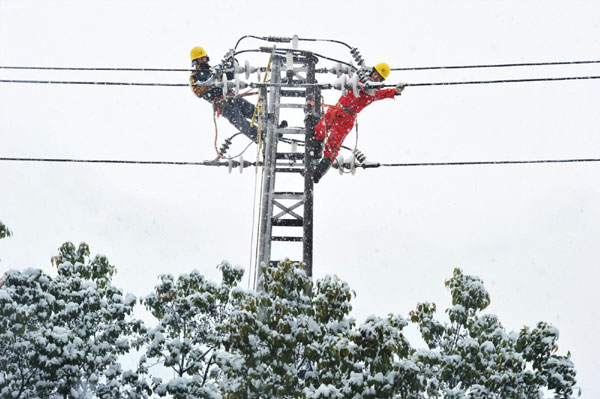
Workers repair electricity lines in snow in Shaoxing city, Zhejiang province on Jan 4, 2013. Snow and icy rain pelted Chinese provinces of Hunan, Jiangxi, Anhui, Zhejiang and Guangxi Zhuang autonomous region on Jan 4, 2013. (Photo/Xinhua)
As temperatures in South China remain low for days together during winter, there are again calls for providing central heating for southern cities. Many people argue that winter is as cold in the south as it is in the north, so why not provide central heating for the southern region as well.
Winters in some southern provinces are indeed as cold as in the north because of climate change, which has made the air wetter with little or no variation in temperature for long hours. But the problem is that wet air lowers the efficiency of the central heating system, for a lot of heat is wasted in drying the air. Besides, cold spells in the south are much shorter than that in the north, so while people in some northern parts need 210 days of heating, in most southern places they need it for just 60 days, even 40 days.
Also, even if devices are installed in communities in South China to provide central heating, they will be used for much shorter periods. That would be a waste of both labor and resources, and ironically, people will have to pay almost the same amount of money for the facility because devices account for a large percent of the total cost of central heating. By no measure will this be a smart choice for families. Therefore, it is highly possible many in the south will refuse to pay for central heating, which would further lower its efficiency and increase its cost.
Many families in the southern region are known to use air conditioners or electric heaters to keep their homes warm. Such devices are not only more economical but also more suitable for southern residents.
Another reason for not providing central heating for the southern region is the high cost of fuel. The majority of central heating systems in Chinese cities burn coal, and most of the country's coal is produced in the north. Since the price of coal could double if transported to the south, it would be a bad economic choice.
Southern residents should note that a majority of the buildings in the north have two-layer glass windows — in some regions even the air between the two glass layers is pumped out to create a vacuum and prevent indoor heat from escaping. In contrast, most buildings in southern cities have single-glass windows that allow indoor heat to escape. Also, buildings in the north have an "extra layer" on their facades to prevent cold outdoor air from seeping indoors. These are a couple of measures southern residents can take to keep indoors warm, instead of seeking central heating.
Of course, for communities in the south that have plants and factories nearby, a different type of central heating could be a good choice, because they can use the "heating" resource produced by the factories. For example, some thermal power plants produce more hot water than needed to generate electricity. This surplus hot water can be used to provide "central heating" for nearby communities at lower prices because the heating resource (hot water) is already available. Still, the majority of the people in the south still have to make individual arrangements for heating.
A note of caution: adding an extra layer to buildings to prevent outdoor air from seeping indoors involves a lot of labor and money. It is therefore important that real estate enterprises add such layers to the facades of the buildings they build in the future and fix two-layer glass windows in new apartments, so that the indoors don't turn into cold storages in winter and make life difficult for the families.
The author, Han Xiaoping, is chief information officer at china5e.com, a domestic energy industry information provider.


















































